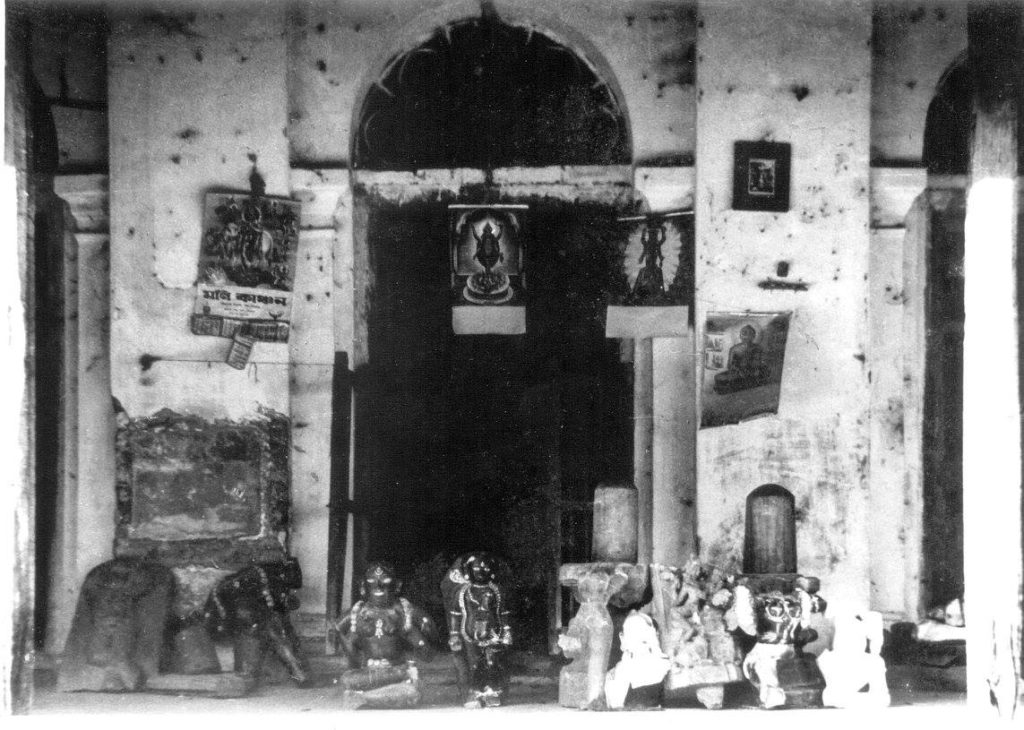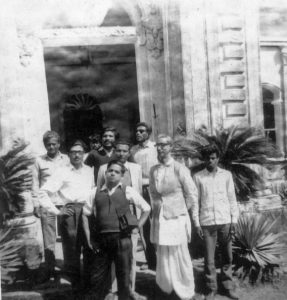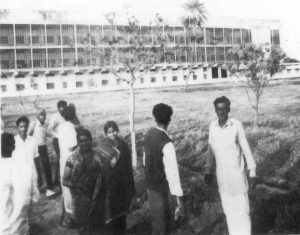The Sunday Statesman 11.03 2001, LITERARY (SHORT STORY)
Who is the Bara Babu?
Sitting down at my desk in the new office. I opened the dak file to find a flaming pink notice staring at me, announcing that as electricity bills of over Rs. 28000/- had not been paid in time, the power supply would be disconnected. Frantic, I called for a vehicle to rush to the electricity supply office.
“Saar, there is no vehicle”, stated my orderly blandly.
But why? I thought we had several!”
“Yes, Saar, but as the fuel bills have not been paid for the last three months, the petrol pump has stopped supplies. So the cars are off-road.”
Limply I sought to drown my anxiety in the newspaper.
“Saar, there are no newspapers.”
I looked at the wall calendar to check if today was a holiday—- what was I doing in office in that case anyway? —-and found the date in prominent black announcing its uncompromising work-a-day character. Mustering my wits I enquired. “But today is not a holiday. Why is there no newspaper?”
“Saar, the paper-wallah’s bills of many thousands of rupees have not been paid for many years. So he has stopped supplies.”
By now I had marshalled the facts and unerringly spotted the villain of the piece. The needle of suspicion pointed quiveringly at the chap who prepared bills: the Bill Clerk.
“Bill Clerk ko bulao!’ I ordered confidently.
The orderly peon did not stir. He stood there, meditatively scratching the calf of his right leg with the toes of the left.
“Why are you standing here?” I put it to him keenly. “I asked you to produce the Bill Clerk”
“Saar, koi Bill Babu nahi hai, there is no Bill Clerk,” he declared.
I was flummoxed. “To kaun hai? Who is there? Is there any other Babu?’ I asked.
“Baro Babu hai, Saar”.
How had I managed to forget that every office is ever blessed with the Baro Babu, the Head Clerk, to whom notes are usually marked with that cryptic anagram HC, gleaming with restrained power, like a high-spirited nag champing at the bit. For, his is the hand that rocks the administrative cradle.
“Baro Babu ko bulao!” I ordered smugly and leaned back, steepling my fingers, my eyes shut in preparation for a session of investigation to pin down the culprit responsible for the power being disconnected, cars being off-road and no newspapers to minister to the fevered brain and the soul sore-taxed. So what if load-shedding was endemic? The prospect of fans whirring occasionally was not a prospect to be denied lightly just because the HC had not prepared the bills. But, I mused, why was the powerful potentate stooping to so a menial task as drawing up bills ‘ a chore usually reserved for callow recruits to the lower echelons of the clerical cadre
Having collected my thoughts, when I opened my eyes I was startled to find the peon still standing before me, still scratching what must have been a very itchy calf. My consternation must have been obvious from my mouth hanging open. I did not have to ask the obvious question. He volunteered the explanation: “Saar, Baro Babu nahi hai, the Head Clerk is not there.”
Aha! But you said just now that the HC hai” I riposted sharply. If these chaps thought their new boss was soft in the head, they were mistaken. Things were not going to be that easy around here any more. Someone was in charge finally!
“Saar, Baro Babu is in High Court.”
By dint of intensive probing I was able to piece together the scenario. The HC had started a case in the High Court and was busy pursuing it on most working days, giving of himself to the office twice a week to attend to matters he considered urgent in nature.
So, the HC was in court. But surely there would be other clerks from whom details of the bills could be ascertained? The answer was dismaying: “Saar, koi Babu nahi hai, there are no other clerks”‘no upper division clerk, no lower division clerk! As I strove to clutch on to the shreds of my reason and decide whether I dared ask why there were no other clerks, my eagle eye fastened on a shadow lurking outside the frosted glass entrance to my room. “Woh Kaun hai?” I shouted, “Who is there?’
“Sir, I am the Head Clerk”, said an ingratiating smile capped by a bald pate.
“Aha! But you can’t be”, I said, shrewdly pinpointing the contradiction. “The HC is in court today.”
“But, Sir, I am the real Head Clerk!”
I gasped. Curiouser and curiouser: two HCs–the pretender and the real McCoy. The lurker-behind-the-door carried on: “Sir, you are so vastly experienced in administration. You know all the rules. Sir, So I need hardly remind you that the maximum period of lien on one’s permanent post while on deputation is three years. Sir, I was kept here for ten years. And then, one day, without the least consideration for all the blood, sweat and tears I had shed in service of this office. I was reverted to my original office. Naturally. I had to seek the shelter of the High Court against such rank injustice. And then, Sir, the chap junior to me here, a mere Upper Division clerk, who had learnt everything at my knee, called himself the HC and even filed a case in court demanding that they declare him as such.”
The Murky Mystery of the Missing Babu, Baro and others, was at last clear. Till the court pronounced on the status of the rival claimants, the posts of the other clerks could not be filled up. Serendipitously I had come upon that most rare of happenings: an office bereft of that wondrous phenomenon of whom Kipling wrote, “The Babu is a great man and, to respect him, you must see five score or so of him in a room a hundred yards long, bending over ledgers, ledgers and yet more ledgers ‘ silent as the Sphinx and busy as a bee. He is the lubricant of the great machinery whose ways and works cannot be dealt with in a single scrawl.”
Having nothing better to do ‘ the HC not having “put up” anything ‘ I wandered about the building and came across an air-conditioned, glass-panelled room. Squashing my nose against the glass door, I could make out several tables with shrouded upright blocks atop them. My helpful orderly announced this was the Computer Room.
Now computers are something I fancy I understand. So, I dared ask the computer assistants to unlock the room and take off the wrappings. The machines were unshrouded. “Switch them on!” I commanded. The switches were put on. Some monitors blinked; others went on staring darkly at me.
“What’s wrong?” I asked.
“Sir, they are full of viruses, we don’t know how to remove them.”
“But a couple are showing the correct display. Please make me a graphical display of the number of courses we are running this year.”
The silence was deafening. “Don’t you have LOTUS loaded?’ I asked.
“Yes Sir. I was the Storekeeper and got promoted to this post, as I was senior-most. Yeh lotus wotus kya hai, Sir?”.
I turned to the second computer assistant hopefully. “Sir, I was the Xerox operator, next senior-most.”
“Is there anyone who knows how to run the machines?” I enquired.
“Yes, Sir. But one is away attending theatre rehearsals and the lady has been away.”
“When does the lady get back?”
“We don’t know, Sir. She has not been coming for years.”
Intrigued, I made enquiries and found that we paid a computer firm over fifty thousand rupees a year to maintain the computers. Since no one could run them, there were no complaints for the firm to attend to. The missing lady had been on leave for over 800 days so far. Occasionally she dropped by to break a spell of absence that had become noticeably long, collected her pay, and vanished again. Since there was no fully functioning HC, there was no absentee-statement.
I called for a P.A. to dictate my amazing discoveries. “Saar, P.A. nahi hai,” informed the orderly. By this time I had got wise to the situation. “Is it that there is no P.A. or is he absent?” I asked, making the point forcefully. “I am supposed to be having two P.A.s you know,” I added, rubbing in my status. The orderly explained that in this office there were no P.A.s at all, only stenos. “All right, then call the senior-most steno.” Apprehensively, I noticed him shuffling away with reluctance. After some time a lady came in. Through pointed questions I was vastly relieved to find that she was so senior as to be actually drawing pay in the P.A.’s grade. My status was unimpaired! Shutting my eyes contentedly, I leaned back and launched into dictating my horripilating discoveries. After five minutes, pausing at the end of a paragraph, I found to my consternation that she was sitting with a blank face and a finger that neither moved nor wrote.
“What’s the matter?” I asked.
“Sir, I am used to taking dictation only from Baro Babu, so I cannot follow your accent or manage your pace”, she answered.
Here was an HC indeed! One who dictated to the only stenographer drawing a P.A.’s pay.
Letting dictation fall by the way, I went round the campus. There was an imposing edifice still incomplete but with no signs of any work in progress. The Caretaker told me that this was to have been completed five years back. Work had stopped a year ago after the agency had received all the funds running to several crores, he whispered.
“Since it has not been handed over to us, I suppose I can’t take a look inside?” I asked.
“Oh, but you can, Sir! Since some doors and windows have been stolen, we can get in through the gaps.”
So we climbed in. Large cracks ran diagonally through every wall of the building from top to bottom. The Caretaker took me to another new building. This one had been handed over a few months ago. We entered. Electrical fittings newly installed on the walls and ceilings lay on the floor, broken. Some tube lights dangled precariously from the ceiling. This was the new library, in use as a godown for heaps of broken furniture and torn linen.
What about the old library? The last librarian had left quickly after being mercilessly ragged by the staff. The new one asthmatically wheezed that there was no accession register of books, no catalogue cards, and so it was not possible to ascertain how many books were missing. Whenever anyone left, he took along books he fancied a la Mark Twain. And the library peon was in the habit of staggering in and wagging a drunken finger threateningly at the Librarian should he dare to start cataloguing.
Next, the hostel-of-a-hundred-rooms! I entered through a seven-by-four glass door bereft of glass. The Caretaker explained that a cow had come charging through the corridor and dived swan-like through the glass. Cow pats several days old dotted the corridors ‘ evidence carefully preserved, with six safai karmachariscollecting monthly wages. Nearby several healthy cows smugly chewed the cud in the grounds, overgrown with undergrowth. Three malis were on the payroll. Stray canine population merrily chased one another’s tails along the corridors as chowkidars watched benignly and inmates cowered away.
There being a hostel, some arrangements for feeding the inmates I reasoned, must exist and got a immediate response.
“Saar, there is an employees’ co-operative which is bankrupt. They distributed the entire capital among the members as bonus, leaving marketing dues of several lakhs outstanding.”
I noticed a person with a shifty, hangdog look quickly flit by. “Who is that?”. I asked. “That is the co-operative member in-charge of marketing, Saar. He has to keep a sharp look-out to avoid being beaten up by the creditors.” The co-operative had employed people numbering a round dozen to feed the hungry trainees. While the trainees, fed up with paper-thin slices of fish, found their food elsewhere, the cooperative cooks fattened on free meals besides being paid most considerately according to government pay-scales.
“But why has the audit not remarked on this?” I asked.
“Because, Saar, the audit parties went back on finding no cash-book kept for the last ten years, ever since the co-operative was set up.”
“There must be office-bearers responsible for doing things properly?”
“Yes, Saar, the two Baro Babus, ”
“‘. Who fight in court but co-operate warmly in co-operative disorder,” I said to myself!
On the way back I noticed a reception desk. I was told that occasionally this was manned by the “Receptionist-cum-telephone operator”, when the telephone functioned. “What happens if she falls ill?” I asked. Silence. My orderly volunteered the information that there was a “PBX-operator-cum-Receptionist”, but since there was no PBX, she had never worked. “Are there any others like this?” I asked in bewilderment. “Yes, Saar, there is the Tape-recorder-cum-transcriber. Since nothing is taped, she has never transcribed. There are also ‘Programme Assistants’ who cannot spell their designation.”
Shaken, I came back to my room, collapsed on my chair and found myself staring at a blank grey wall. Turning back I found full-size glass windows looking out on rows of tall, majestic deodars swaying in the wind. Most of the window-handles were broken and the windows were tied together with string. The room was uncomfortably warm. My feet, however, were cold. Investigating the phenomenon, I found one air-conditioner next to my chair blowing cool air onto my toes. The other machine was feebly circulating warm air some distance away. The situation became crystal clear: because one machine was not working, the massive table had been dragged over to the only one that was cooling. After all, retaining one’s cool was far more important than looking out on verdant greenery.
There was an air-conditioning plant for cooling the largest classroom not in operation for many years, because enough water was not available for the cooling tower, the ferrules being jammed. Getting them cleaned would cost about a hundred rupees. As no fans had been installed, that room could only be used in winter. The cooling machines in the other lecture-halls had all been taken away for servicing months ago and never put back, leaving huge gaps in the walls for rain and wind to buffet those within.
“Why couldn’t the firm responsible be contacted?” I asked in irritation.
“Because the files are with the Baro Babu, Saar”.
I ought to have known better!
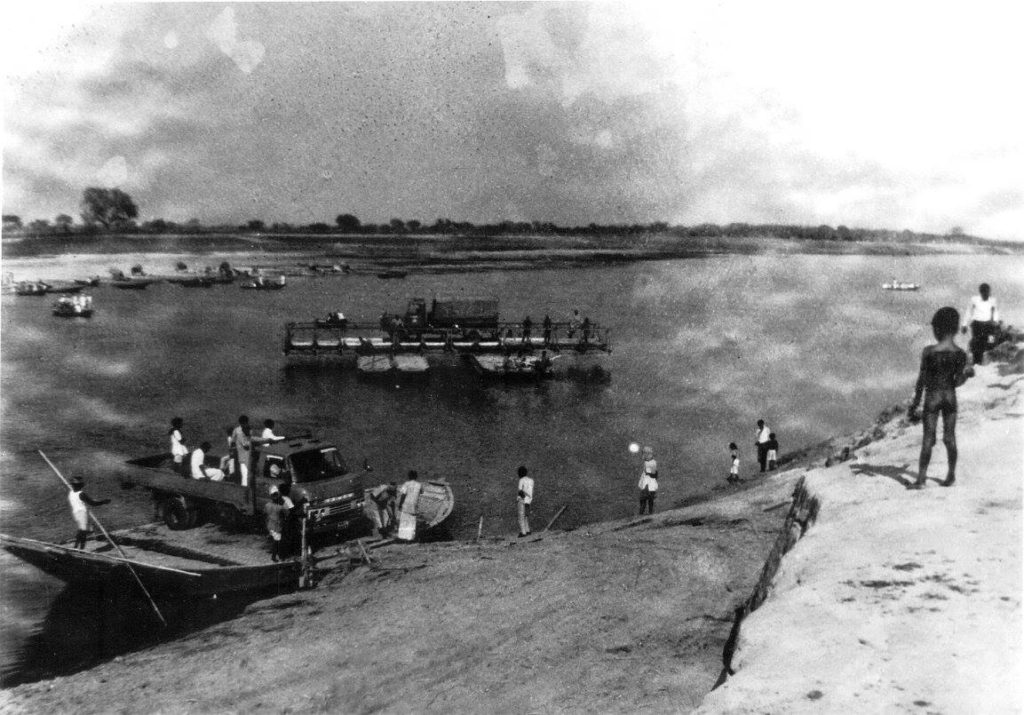
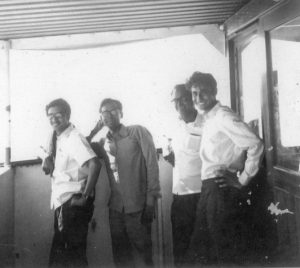 On barge to Dacca. Rathin Kar, Madhusudan Bhattacharjee, Sailen Majumdar, Gorachand Chakraborty, all WBCS officers accompanying me.
On barge to Dacca. Rathin Kar, Madhusudan Bhattacharjee, Sailen Majumdar, Gorachand Chakraborty, all WBCS officers accompanying me.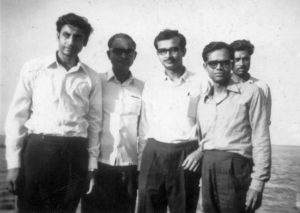 Aboard barge ferrying 12 UN trucks Aricha to Nagarbari Ghat, Dacca, 18.3.72. Gorachand Chakravarty, Sailen Majumdar, me, Madhusudan Bhattacharjee, our driver behind extreme right.
Aboard barge ferrying 12 UN trucks Aricha to Nagarbari Ghat, Dacca, 18.3.72. Gorachand Chakravarty, Sailen Majumdar, me, Madhusudan Bhattacharjee, our driver behind extreme right.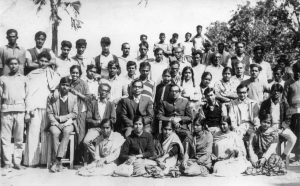 Kutubsahar Evacuee Camp with SP De, DM Malda and officials, 1972 Jan or Feb
Kutubsahar Evacuee Camp with SP De, DM Malda and officials, 1972 Jan or Feb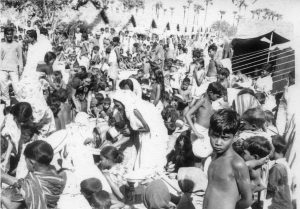 Kutubsahar Camp Malda, spl milk distribution on 26 March, Liberation Day of Bangladesh
Kutubsahar Camp Malda, spl milk distribution on 26 March, Liberation Day of Bangladesh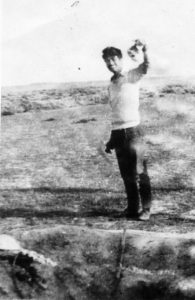
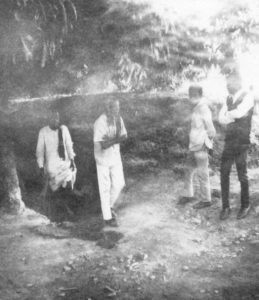
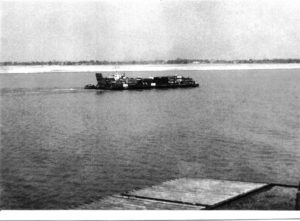
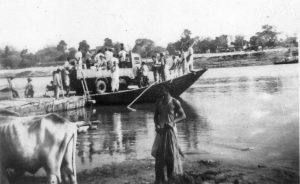 From Sibganj to Nawabganj
From Sibganj to Nawabganj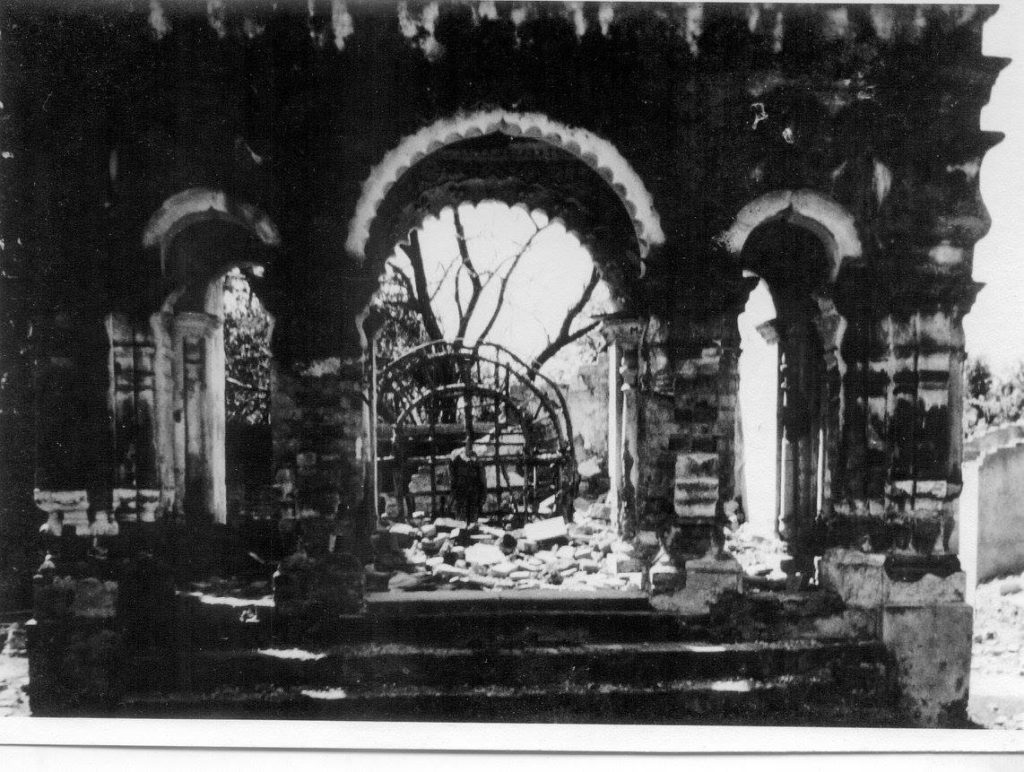
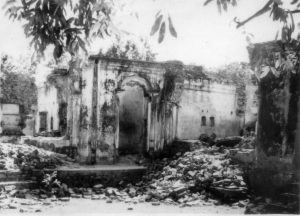 Kartik temple, Harinagar, demolished by Pak army. Feb 1972
Kartik temple, Harinagar, demolished by Pak army. Feb 1972
